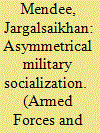|
|
|
Sort Order |
|
|
|
Items / Page
|
|
|
|
|
|
|
| Srl | Item |
| 1 |
ID:
119061


|
|
|
|
|
| Publication |
2013.
|
| Summary/Abstract |
This article presents a small state's perspectives on military socialization by examining military interactions at political and strategic, operational, and tactical as well as educational tiers. Transnational military socialization creates learning and socializing environments for militaries. However, the transnational military socialization process in Asia has received little scholarly attention, although its nature changed dramatically after the Cold War and 9/11. A small state often enters into asymmetric socialization with major powers. Mongolia presents an interesting case to capture these changes and impacts of transnational military interactions. The Mongolian military internalized Soviet military norms, ideas, and values during its seventy-year military socialization process. Since then, it has been attempting to disconnect from its communist past by internalizing the Western military norms, ideas, and culture even though it is isolated from the Western world. Interactions between Sino-Mongolian militaries over the past two decades have not resulted in any in-depth exchanges of ideas due to political, historical, and cultural factors. In the absence of explicit pressures from these three major powers, today the Mongolia military has consolidated a new identity, similar to a Western military. It has increased its contribution to peace support operations while attempting to disconnect its Soviet past and avoiding absorption from the growing Chinese military initiatives toward Central Asia. At the same time, Mongolia's military socialization with Russian or American militaries often triggers uncertainty for Chinese security.
|
|
|
|
|
|
|
|
|
|
|
|
|
|
|
|
| 2 |
ID:
119427


|
|
|
|
|
| Publication |
2013.
|
| Summary/Abstract |
Although the role of intelligence services has been addressed in many recent discussions of the democratization process, yet it has not yet generally been pursued sufficiently by academics and politicians. 1 Mongolia and its intelligence services have been among those countries undergoing a democratic transition and consolidation process. Mongolia is the only formerly Communist Asian state whose democratization process has not regressed. In fact, since 1990, electoral democracy has become the "only game in town," where space for a vibrant civil society exists, and the security institutions have remained outside of the political and economic contests. 2 Approval in early 2012 of the law on conflicts of interest, a set of laws concerning the judiciary, revisions of the election law, and a sustained public demand for good governance are signs of a healthy nascent democracy, one which admittedly still has room for improvement. 3 Unique in the region, Mongolia's security organizations-the military, intelligence agencies, and police-have remained mostly outside of this political transformation. The role of these security institutions in the quest for democratization has often been ignored because of a misperception about their roles and centrality, and the reality of the Soviet military presence in Mongolia during the Cold War.
|
|
|
|
|
|
|
|
|
|
|
|
|
|
|
|
|
|
|
|
|